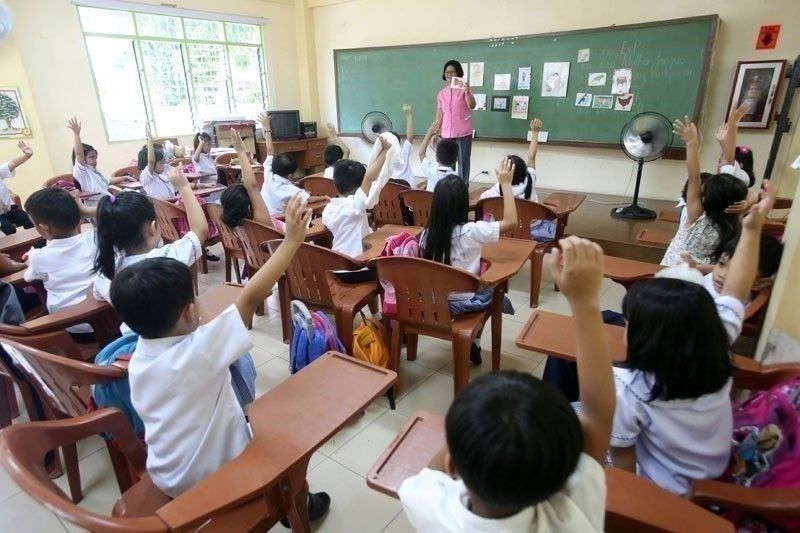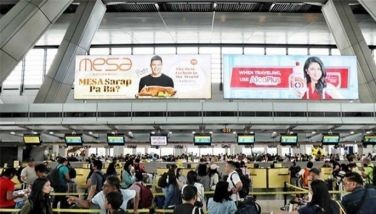IATF reviewing policy on face-to-face classes

MANILA, Philippines — Members of the government’s pandemic task force are preparing a presentation that would help President Duterte decide on the proposal to conduct pilot in-person classes in low-risk areas, Malacañang said yesterday.
Presidential spokesman Harry Roque said officials are expected to tackle the presentation before the opening of classes in September.
“Selected members of the IATF (Inter-Agency Task Force for the Management of Emerging Infectious Diseases) are preparing a presentation for the President to show that the advantages of a pilot outweigh the disadvantages,” he said at a press briefing.
Roque said the presentation may include the recent report of United Nations Children’s Fund (UNICEF), which enumerated the negative effects of school closures on students.
According to UNICEF, the consequences of school closures include learning loss, mental distress, missed vaccinations and heightened risk of dropout. The international body noted that the Philippines is one of the five remaining countries that have not resumed face-to-face classes.
Roque noted that under the law, the President has the power to decide on the resumption of classes.
He added that three things are being considered for the pilot in-person classes, namely the President’s approval, the risk classification of an area, and the economy.
“Of course we need the approval of the local government,” Roque said.
Duterte previously said he would allow in-person classes to resume if many persons have been vaccinated.
“There are areas that have been under MGCQ (modified general community quarantine) for a long time so maybe we can do it in these places. But let us allow our President to have confidence first,” Roque said.
Last June, Duterte said he can’t place students at risk while the Philippines is still grappling with highly contagious COVID-19 variants.
Localized lockdowns seen
Yesterday, Malacanang said the government is heading toward the “more effective” localized lockdowns as the Philippines continues to battle a rising number of COVID-19 infections.
Roque said the implementation of granular lockdowns has been approved in principle but details still have to be threshed out.
“Let us wait for the pronouncements of IATF. We are moving toward the direction because local government units are the ones who know the areas but there are no details yet,” he said at a press briefing.
“From the start, the science supports and our experience supports the view that localized and granular lockdowns are more effective,” he added.
Metro Manila, the country’s economic center, had been placed under the strictest enhanced community quarantine (ECQ) because of the rapid rise in COVID-19 infections linked to the highly contagious COVID-19 Delta variant.
The capital region was downgraded to MECQ on Aug. 21 but restrictions on indoor and al-fresco dine-in services, personal care services and in-person religious gatherings were retained.
Officials were scheduled to discuss the preliminary report for the updated community classifications yesterday.
Asked about the chances of Metro Manila being downgraded to the more lenient general community quarantine, Roque replied: “I cannot say because that’s a collegial decision. But for now, our healthcare utilization rate is at high risk.”
Despite the continuous increase in the number of infected persons, he said Metro Manila’s healthcare system is not yet overwhelmed because nearly half of its eligible population have been vaccinated.
“That is proof that vaccines are effective,” he added.
Roque previously said that the government was balancing the need to contain the pandemic while ensuring that people would not go hungry because of lockdown restrictions.
A hard lockdown lockdown would be the “last resort” because it could derail the country’s economic growth this year, he said.
Gov’t agencies fully operational
Executive Secretary Salvador Medialdea said government agencies in Metro Manila would remain fully operational even if the region is under MECQ until Aug. 31.
Under Memorandum Circular No. 88, all agencies and instrumentalities of the executive branch in Metro Manila shall only have a skeleton workforce on site, the size of which shall be determined by the head of agency.
“To ensure continuity of government service, the skeleton workforce shall not be less than 20 percent on-site capacity at any given time, with the remainder being under work-from-home arrangements,” the memorandum signed by Medialdea read.
“Nonetheless, agencies providing health and emergency frontline services, laboratory and testing services, border control, and other critical services shall be allowed up to full on-site capacity.”
As the government faces criticism over the way it is addressing the pandemic, Roque reiterated that the administration is handling the health crisis well.
He cited a statement of World Health Organization (WHO) country representative Rabindra Abeyasinghe, who had said that the Philippines has a “very good comprehensive plan.”
The WHO has also lauded the Philippines for using lockdowns wisely and for preventing a large number of deaths, Roque added.
“So, please next time you ask me I will just flash this on the screen because anything I say might be construed as self-serving...We have managed it well according to the WHO,” the Palace spokesman said.
- Latest
- Trending





























